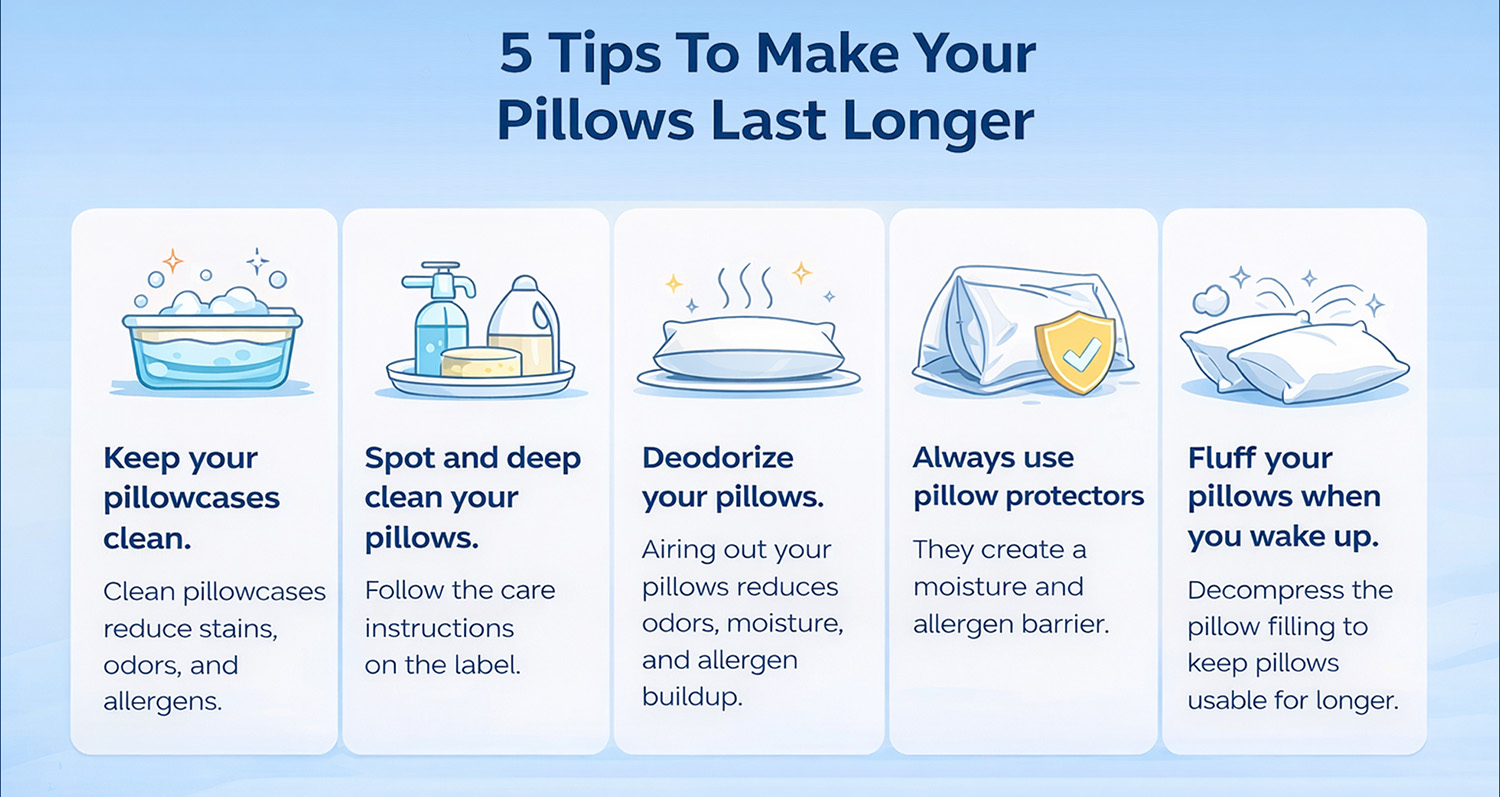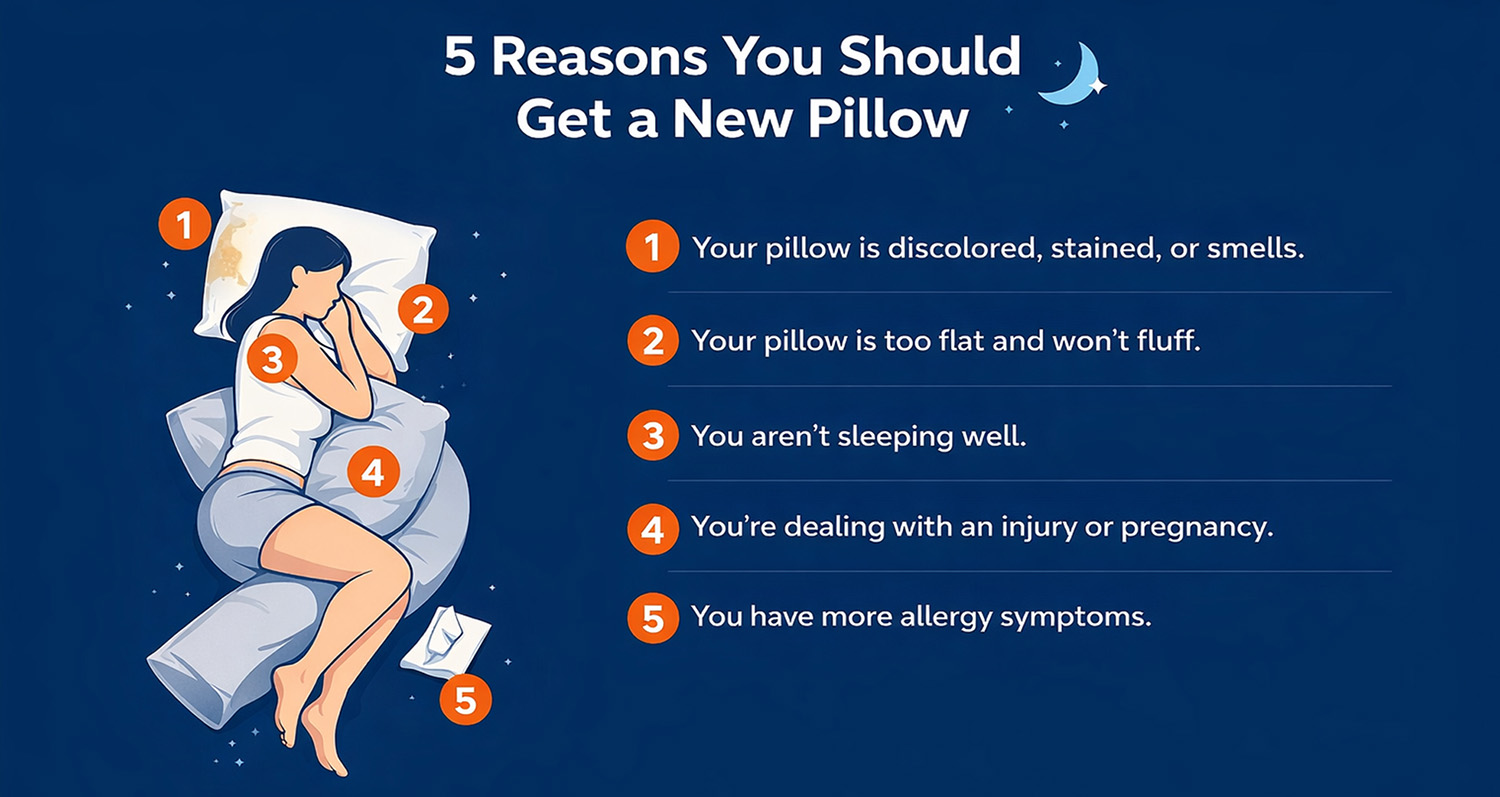The majority of people consider changing their mattress every few years, but they hardly ever give their pillow the same consideration. However, the quality of your sleep, spinal alignment, hygiene, and even the long-term health of your neck and shoulders are all greatly impacted by your pillow.
Your pillow might be the cause of stiffness, restless sleep, or allergies that worsen in the morning. What is the recommended duration for replacing pillows?
Generally speaking, most pillows need to be replaced every one to three years, although the precise replacement interval varies depending on the material, your sleeping habits, and the pillow's maintenance.
To help you sleep better and maintain your health, this guide explains replacement schedules by type of pillow, obvious indicators that your pillow needs to be replaced, hygiene issues, and expert-backed recommendations.
How Often Should You Replace a Pillow?
If you’re short on time, here’s a simple breakdown:
- Memory foam pillows: Every 2–3 years
- Latex pillows: Every 3–4 years
- Down or feather pillows: Every 1–2 years
- Polyester or fiber pillows: Every 6 months to 1 year
Even if a pillow looks fine on the outside, internal materials can degrade long before visible wear appears.
Why Pillow Replacement Matters More Than You Think
Your pillow supports your head and neck for roughly 7–9 hours every night. Over time, it absorbs sweat, oils, dead skin cells, and allergens. At the same time, the internal structure slowly breaks down, reducing its ability to keep your spine aligned.
An old pillow can contribute to:
- Neck and shoulder pain
- Poor spinal posture during sleep
- Increased tossing and turning
- Allergy flare-ups
- Lower overall sleep quality
Replacing your pillow on time isn’t just about comfort—it's about health.

How Often Should You Replace Your Pillow by Material?
Different pillow materials age very differently. Understanding what your pillow is made of helps determine when replacement is truly necessary.
Memory Foam Pillows
Memory foam pillows are known for contouring support, but the foam gradually loses resilience with use. Even high-quality memory foam eventually softens and compresses internally.
Replace every: 2–3 years
Why: Foam breakdown leads to poor neck support and pressure imbalance
Watch for: Permanent indentations, loss of loft, heat retention
Latex Pillows
Latex pillows are more durable and naturally resilient. They hold their shape longer and are often more breathable than memory foam.
Replace every: 3–4 years
Why: Natural oxidation and firmness changes occur over time
Watch for: Crumbling, firmness loss, and surface cracking
Down and Feather Pillows
Down and feather pillows feel soft and plush but tend to flatten quickly. They also trap moisture and allergens more easily.
Replace every: 1-2 years
Why: Clumping, compression, and hygiene concerns
Watch for: Uneven filling, loss of fluff, worsening allergies
Polyester and Fiber Pillows
Polyester pillows are budget-friendly but have the shortest lifespan. They compress quickly and lose support faster than other materials.
Replace every: 6 months to 1 year
Why: Fibers break down rapidly
Watch for: Permanent flatness, poor neck support
Pillow Lifespan Comparison Table
| Pillow Type | Average Lifespan | Support Longevity | Hygiene Risk |
|---|---|---|---|
| Memory Foam | 2–3 years | High (declines gradually) | Medium |
| Latex | 3–4 years | Very high | Low |
| Down / Feather | 1–2 years | Medium | High |
| Polyester | 6–12 months | Low | High |
10 Signs It’s Time to Replace Your Pillow
Not sure if your pillow needs replacing? These signs are clear indicators that it’s time:
- You wake up with neck or shoulder pain
- Your pillow stays flat after fluffing
- Your head sinks too deeply
- You experience frequent morning headaches
- The pillow smells even after washing
- Yellow stains or discoloration appear
- Allergies feel worse at night or in the morning
- You toss and turn more than usual
- The pillow feels lumpy or uneven
- Sleep quality has noticeably declined
If you recognize more than two of these signs, replacement is overdue.

What Happens If You Don’t Replace Your Pillow?
Using an old pillow doesn’t just affect comfort—it can lead to long-term issues:
- Spinal misalignment: Poor support strains the neck and upper spine
- Chronic discomfort: Ongoing muscle tension and stiffness
- Hygiene issues: Dust mites, bacteria, and mold buildup
- Skin problems: Acne or irritation from trapped oils and bacteria
- Restless sleep: Reduced deep and REM sleep stages
Over time, these problems can impact overall health and daily energy levels.
Does Your Sleep Position Affect Pillow Lifespan?
Yes. How your sleep position influences how your pillow wears out.
Side Sleepers
Side sleepers place more pressure on pillows, especially around the shoulder and neck area. This causes faster compression and loft loss, making timely replacement even more important.
Back Sleepers
Back sleepers distribute weight more evenly, allowing pillows to last slightly longer, though support degradation still occurs.
Stomach Sleepers
Frequent compression and twisting can shorten a pillow's lifespan, especially with softer materials.
Can You Extend the Life of Your Pillow?
Good care can slow wear, but it can’t stop material breakdown entirely.
Helpful habits include:
- Using a pillow protector
- Washing covers regularly
- Fluffing pillows weekly
- Rotating pillow position
These steps improve sleep hygiene, but once support is lost, replacement is the only solution.
Cleaning vs. Replacing a Pillow: What’s the Difference?
Cleaning helps when:
- The pillow still holds its shape
- There’s no odor or deep staining
- Neck support feels consistent
Replacement is necessary when:
- The pillow stays flat or uneven
- Support no longer feels comfortable
- Hygiene issues persist despite washing
Cleaning restores freshness—not structural integrity.
What Experts Say on Pillow Replacement
Sleep specialists agree that pillow replacement should be based on support performance, not appearance alone. Even certified materials like CertiPUR-US or OEKO-TEX foam eventually wear out with nightly use. Regular replacement ensures proper alignment, cleaner sleep, and better long-term comfort.
Final Thoughts
Your pillow directly affects how well you sleep and how your body feels each morning. If your pillow is older than a few years, there’s a good chance it’s already impacting your comfort, posture, and sleep quality. Replacing your pillow at the right time is one of the simplest ways to improve sleep hygiene and wake up feeling refreshed.













